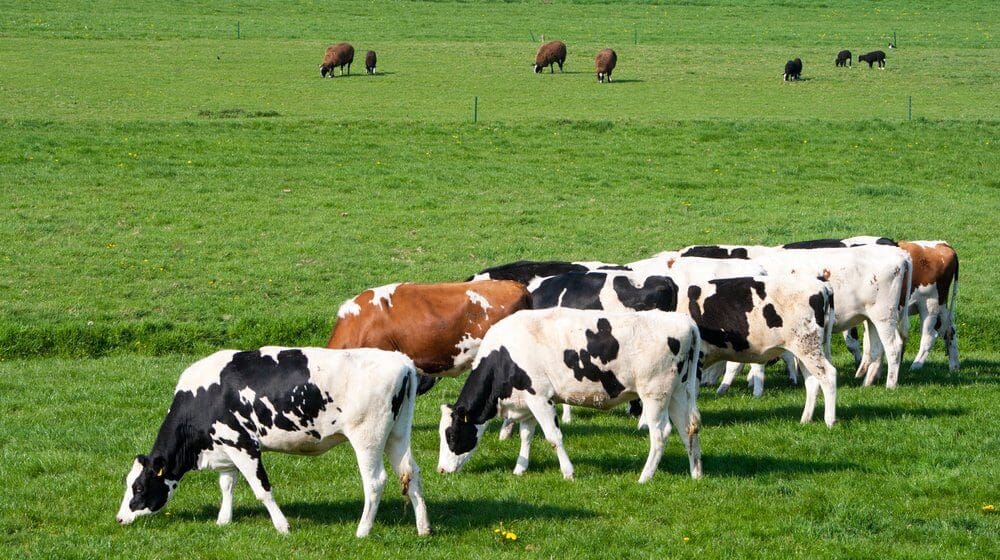
You care deeply about your livestock, and want the best for your animals. It’s important for me to know that animals are receiving thorough, ethical care, whether they are beloved members of the family or are being raised for meat. Happy, healthy, well-cared-for animals are easier to work with, have fewer serious medical conditions, and provide a higher-quality meat from animals who are bred for meat.
I’ve become a huge fan of using essential oils to improve the health and wellness of my family members, and later wondered if there were any uses for essential oils with livestock. I was surprised to find out how effective oils could be with animals, and am excited to share this information with others who might find it useful, as well.
#1 Essential Oils Ward Off Pests for Mammals
There are many different factors that can create stress for cattle and other livestock, and pests are a leading cause. Fleas, mosquitoes, flies, and lice are irritating nuisances that increase the stress levels of your cows. Many different essential oils are excellent pest-repellants. Mix one part of anise, camphor, cedar, eucalyptus, lavender, pine, rosemary or sassafras with two or three parts of plain vegetable oil, and massage the mixture into your cattle’s coats. Mixing multiple oils, like lemon, rosemary, and peppermint is especially helpful for keeping mosquitoes away.
Basil has been proven to have strong repellent and larvicidal properties, as well as thyme.
Our Top Recommendation
Almost regardless of which insect is infesting your home or yard, our top recommended solution is the same. Cedar oil is a safe, non-toxic and all natural solution for killing and repelling most insects.
Cedar oil does not harm beneficial insects like bees and butterflies, but it is a contact killer and effective repellent for most insects you’d want to get rid of. See this article to learn more about cedar oil or to see the full range of cedar oil products, click here.
#2 Cedar is A Better Bet for Horses
When it comes to biting pests, cedar oil is one of the top choices for keeping flies, gnats, chiggers, mites and ticks away from your horses and cows. The bites can cause painful welts, and the stress levels can interfere with the animal's’ overall health; milk production in cows decreases and horses may be injured trying to escape from biting flies.
Typical treatments can include toxic and harmful chemicals, but cedar oil is safe for everyone, and not only works to kill insects, but also repels them. The scent of cedar overwhelms the breathing system of most insects, preventing them from breathing, and disrupting their pheromone signals to create a barrier that keeps future pests away. Cedar oil also works as a natural fungicide, and helps to treat skin problems.
Where to Buy Cedar Oil
For a full range of cedar oil products for use on yards, pets, livestock, humans and more, visit Cedarcide.
#3 Caring for Chickens
Since there can be so many illnesses and diseases spread through a chicken coop, many owners prefer not to add toxic chemicals to the mix. When using essential oils, it’s important to find safe, mild oils that won’t irritate the chicken’s breathing and respiratory system.
Citrus oils, like lemon, are ideal for cleaning the coop, and many farmers have found multiple uses for oregano essential oil, as an antibiotic, appetite stimulant, and guard against infections. The USDA is also studying possible benefits and effects of citrus peels and essential oils in the health of chickens.
#4 Perfect Oils for Pigs
Essential oils have been found to be very beneficial for pigs. A few years ago, an outbreak of Porcine Epidemic Diarrhea Virus (PEDv) spread around pig farms, causing a 100 percent mortality rate for suckling piglets. One farmer, wary of the use of antibiotics, began using oregano, chili powder, and other essential oils to treat the pigs, which resulted in fewer sows showing signs of sickness.
One study added a blend of thymol, a thyme derivative, and cinnamaldehyde, a cinnamon flavonoid, to the diet of several pigs, and found that they had increased growth, improved intestinal ecology, and decreased bacteria.
#5 Essential Oils in the Barn
The strong odors in barns can affect the health of your horses and cattle, as well as cause damage to the humans who also breathe in the fumes. It’s vital that barns are kept clean and dust-free; unfortunately, garden or barn lime, which helps to neutralize odors, causes excess dust and could cause lung damage.
Eucalyptus, lemon and pine essential oils are ideal for killing odors in the barn. Mix about 25 drops of oil with a few teaspoons of grain or rubbing alcohol and distilled water in a medium spray bottle. This mixture can be sprayed regularly on the floor and mats around the barn.
Eucalyptus oil also has antibacterial properties and stimulates the immune system, making it a top choice for overall barn health.
I love that essential oils are non-toxic, which makes them safe not only for my animals, but for anyone who comes around the barn. Reducing and eliminating the chemicals used for antibiotics, cleaning, and treating pests and stress can leave your animals, your staff, your customers and your family happier and healthier.
I hope you’ve enjoyed this list. There are so many uses for essential oils with livestock, and by incorporating even one or two of these uses, you should see an improvement on your farm. Have you tried any of these methods? I’d love to hear what you thought of this article — and feel free to share with your fellow farmers.
